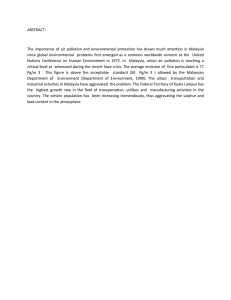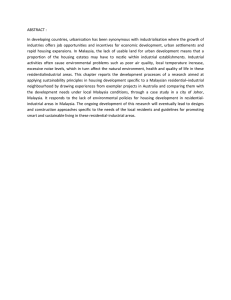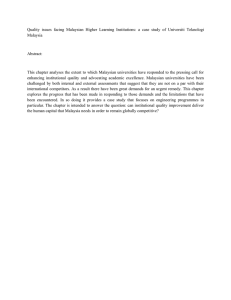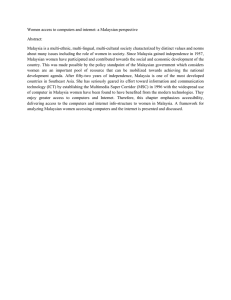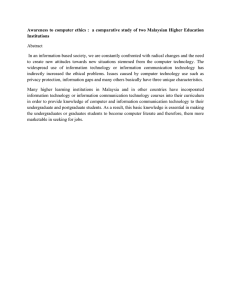ADVANCE QUESTIONS TO MALAYSIA NETHERLANDS
advertisement
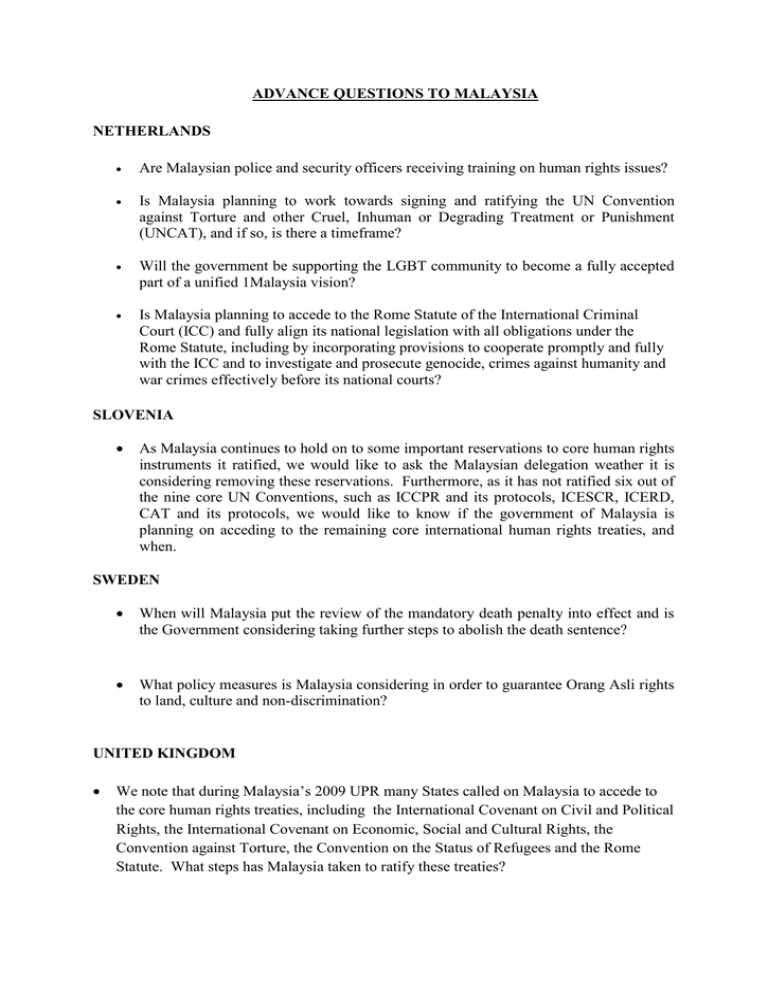
ADVANCE QUESTIONS TO MALAYSIA NETHERLANDS Are Malaysian police and security officers receiving training on human rights issues? Is Malaysia planning to work towards signing and ratifying the UN Convention against Torture and other Cruel, Inhuman or Degrading Treatment or Punishment (UNCAT), and if so, is there a timeframe? Will the government be supporting the LGBT community to become a fully accepted part of a unified 1Malaysia vision? Is Malaysia planning to accede to the Rome Statute of the International Criminal Court (ICC) and fully align its national legislation with all obligations under the Rome Statute, including by incorporating provisions to cooperate promptly and fully with the ICC and to investigate and prosecute genocide, crimes against humanity and war crimes effectively before its national courts? SLOVENIA As Malaysia continues to hold on to some important reservations to core human rights instruments it ratified, we would like to ask the Malaysian delegation weather it is considering removing these reservations. Furthermore, as it has not ratified six out of the nine core UN Conventions, such as ICCPR and its protocols, ICESCR, ICERD, CAT and its protocols, we would like to know if the government of Malaysia is planning on acceding to the remaining core international human rights treaties, and when. SWEDEN When will Malaysia put the review of the mandatory death penalty into effect and is the Government considering taking further steps to abolish the death sentence? What policy measures is Malaysia considering in order to guarantee Orang Asli rights to land, culture and non-discrimination? UNITED KINGDOM We note that during Malaysia’s 2009 UPR many States called on Malaysia to accede to the core human rights treaties, including the International Covenant on Civil and Political Rights, the International Covenant on Economic, Social and Cultural Rights, the Convention against Torture, the Convention on the Status of Refugees and the Rome Statute. What steps has Malaysia taken to ratify these treaties? Does the Malaysian Government have any plans for electoral reform, noting statements by some domestic observers that the 13th General Election held in May 2013 was “partially free and not fair”? What steps are the Malaysian Government taking to ensure there is proper oversight of the police force given the high number of deaths in police custody? Will the Government encourage Parliament to debate Suhakam’s annual report? What steps will the Government take to address Suhakam concern about “ill-treatment, discrimination, bullying, vilification, humiliation and intimidation of sexual minority groups”? UNITED STATES OF AMERICA Prevention of Crime Act: Malaysia’s August 2013 national report cites the repeal of the Internal Security Act and the end of preventive detention as a positive legislative development related to civil and political rights. However, amendments to Malaysia’s Prevention of Crime Act passed on October 3, 2013, authorize the government to detain certain criminal suspects without trial for renewable terms of two years. Will Malaysia commit to further amending the Prevention of Crime Act, in consultation with members of civil society, to provide clear safeguards against the Act being used against those exercising their internationally recognized rights of expression, assembly, and association? Religious Freedom: In its national report, Malaysia states that the Peaceful Assembly Act 2012 (PAA) was enacted to support the Federal Constitution’s guarantee of the right to assemble peaceably. However, The Department of Islamic Development Malaysia (JAKIM) within the prime minister’s office establishes federal guidelines concerning what constitutes “deviant” behavior or belief, and forbids religious assembly and worship for what the government deems as “deviant” sects such as Shia, Ahmadiyyah, and Al-Arqam. Will Malaysia commit to undertake legislative reforms to ensure that the right to peaceful assembly, as guaranteed in the Federal Constitution, is accorded to all individuals, regardless of religious affiliation? General Elections: As noted in its national report, the Malaysian government has highlighted the need to strengthen the Election Commission as part of its effort to ensure a fair and free election process. In the post-election period, Prime Minister Najib promised to form an independent, bi-partisan parliamentary committee made up of government and opposition members to oversee the Election Commission. However, opposition and civil society groups note the absence of public consultation in the design of this new committee. Will the Malaysian government commit to full and ongoing consultation with opposition political parties and civil society groups in the design of any independent, bi-partisan parliamentary committee to oversee the Election Commission, and in any other reforms to the electoral process? Human Rights of LGBT Persons: In its national report, the Government of Malaysia highlights its commitment to taking the needs of the most vulnerable into account when protecting human rights. Members of the LGBT community are vulnerable to violence and discrimination. Certain actions by the Malaysian government have increased the LGBT community’s vulnerability, including sponsoring a play that appears intended to belittle the LGBT community, hosting seminars on the dangers of the LGBT lifestyle, and sending boys judged to exhibit effeminate tendencies to boot camp to be “rehabilitated.” What specific measures will the Malaysian government take to protect members of the LGBT community from violence and discrimination?
